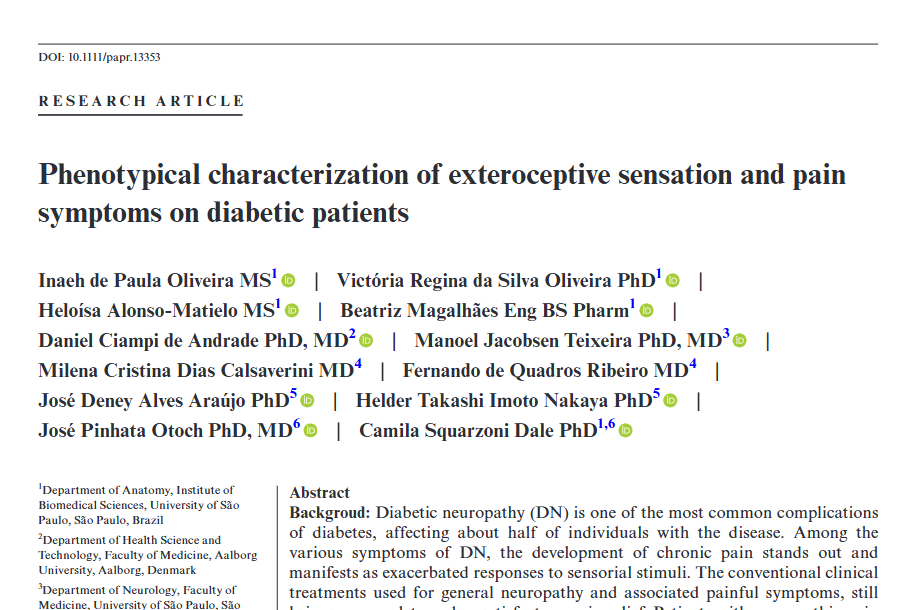Phenotypical characterization of exteroceptive sensation and pain symptoms on diabetic patients.
BACKGROUD: Diabetic neuropathy (DN) is one of the most common complications of diabetes, affecting about half of individuals with the disease. Among the various symptoms of DN, the development of chronic pain stands out and manifests as exacerbated responses to sensorial stimuli. The conventional clinical treatments used for general neuropathy and associated painful symptoms, still brings uncomplete and unsatisfactory pain relief. Patients with neuropathic pain syndromes are heterogeneous. They present with a variety of sensory symptoms and pain qualities which difficult the correct diagnosis of sensory comorbidities and consequently, the appropriate chronic pain management. AIMS: Herein, we aimed to demonstrate the existence of different sensory profiles on diabetic patients by investigating epidemiological and clinical data on the symptomatology of a group of patients with DN. METHODS: This is a longitudinal and observational study, with a sample of 57 volunteers diagnosed with diabetes from outpatient day clinic of Hospital Universitário of the University of São Paulo-Brazil. After being invited and signed the Informed Consent Form (ICF), patients were submitted to clinical evaluation and filled out pain and quality of life questionnaires. They also performed quantitative sensory test (QST) and underwent skin biopsy for correlation with cutaneous neuropathology. RESULTS: Data demonstrate that 70% of the studied sample presented some type of pain, manifesting in a neuropathic or nociceptive way, what has a negative impact on the life of patients with DM. We also demonstrated a positive association between pain and anxiety and depression, in addition to pain catastrophic thoughts. Three distinct profiles were identified in the sample, separated according to the symptoms of pain: (i) subjects without pain; (ii) with mild or moderate pain; (iii) subjects with severe pain. We also identified through skin biopsy that diabetic patients presented advanced sensory impairment, as a consequence of the degeneration of the myelinated and unmyelinated peripheral fibers. This study characterized the painful symptoms and exteroceptive sensation profile in these diabetic patients, associated to a considerable level of sensory degeneration, indicating, and reinforcing the importance of the long-term clinical monitoring of individuals diagnosed with DM, regarding their symptom profiles and exteroceptive sensitivity.
Authors
de Paula Oliveira I, da Silva Oliveira VR, Alonso-Matielo H
External link
Publication Year
Publication Journal
Associeted Project
Microbiology or Immunology
Lista de serviços
-
As antisense RNA gets intronic.As antisense RNA gets intronic.
-
Androgen responsive intronic non-coding RNAs.Androgen responsive intronic non-coding RNAs.
-
Conserved tissue expression signatures of intronic noncoding RNAs transcribed from human and mouse loci.Conserved tissue expression signatures of intronic noncoding RNAs transcribed from human and mouse loci.
-
The intronic long noncoding RNA ANRASSF1 recruits PRC2 to the RASSF1A promoter, reducing the expression of RASSF1A and increasing cell proliferation.The intronic long noncoding RNA ANRASSF1 recruits PRC2 to the RASSF1A promoter, reducing the expression of RASSF1A and increasing cell proliferation.
-
Antisense intronic non-coding RNA levels correlate to the degree of tumor differentiation in prostate cancer.Antisense intronic non-coding RNA levels correlate to the degree of tumor differentiation in prostate cancer.
-
Insight Into the Long Noncoding RNA and mRNA Coexpression Profile in the Human Blood Transcriptome Upon Leishmania infantum Infection.Insight Into the Long Noncoding RNA and mRNA Coexpression Profile in the Human Blood Transcriptome Upon Leishmania infantum Infection.
-
Long non-coding RNAs associated with infection and vaccine-induced immunityLong non-coding RNAs associated with infection and vaccine-induced immunity
-
Comparative transcriptomic analysis of long noncoding RNAs in Leishmania-infected human macrophagesComparative transcriptomic analysis of long noncoding RNAs in Leishmania-infected human macrophages
-
SARS-CoV-2 Selectively Induces the Expression of Unproductive Splicing Isoforms of Interferon, Class I MHC, and Splicing Machinery Genes.SARS-CoV-2 Selectively Induces the Expression of Unproductive Splicing Isoforms of Interferon, Class I MHC, and Splicing Machinery Genes.

